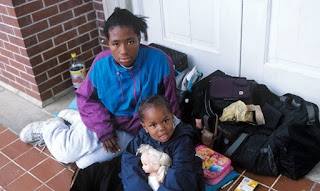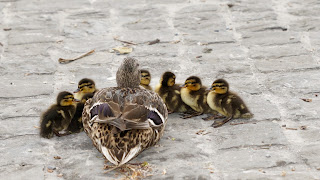Rising Up & Rising Out of Poverty
I'm reading a book recommended by my sister called "A Framework for Understanding Poverty" by Rudy K. Payne, Ph.D. So far it's mind blowing! Did you know that there are hidden rules in every class level? Three hidden rules in poverty are:
1. High noise levels (the TV is always loud)
2. The most important information is non-verbal.
3. One of the main values of an individual to the group is an ability to entertain.
Something else that I read that blew my mind was when the author mentioned that a key point to remember in regards to poverty is, "to move from poverty to middle class or middle class to wealth, an individual must give up relationships for achievement (at least for some period of time)."
I won't give away too much of what I've read so far in case you'd like to read it for yourself. However, so far I'm in awe of some of the scenarios of the daily lives of families living in poverty.
According to the book, "poverty is caused by interrelated factors: parental employment status and earnings, family structure, and parental education." The author measures poverty not only in regards to financial resources, but also emotional, mental, spiritual, physical, support systems, knowledge of middle-class hidden rules, and role models. Reading this book is opening my eyes to some of the patterns and behaviors I need to change as I ascend out of poverty.
Education is one thing that helps move one out of poverty. The other is relationships. In many of the scenarios in the book, the parents didn't have more than a few years of college completed. Yet, with so many other issues at hand, education is usually not a priority in the hectic lives of impoverished families.
I've never contemplated the complex situations that some people live in everyday. Although I did grow up in poverty, my experiences were not half as bad as some of the families in the book. My mom was a teen parent, but there were only two of us and we had the same father. Some women have 5, 6, 7, or 8 children by multiple men. I can't remember my mom being on much welfare because she always had a decent job. Some families only source of income is government assistance. My mom always had a reliable vehicle. My dad wasn't in a gang, never was in jail, and didn't sell drugs. My dad wasn't the best father, but I knew him well and he loved his children. Some kids don't know their fathers, have never seen their fathers, or were kept away from their fathers.
I never had to live with a disabled sibling, or a senile grandparent. I always had shelter, food, clothing, and even cable. Most of the time our family had financial resources, but we lacked emotional resources, role models, knowledge of hidden rules, and solid spiritual resources.
In less than a year, I'll have a bachelor's degree. My son's father has a bachelor's degree as well. We have the education part figured out. My next hurdle is gaining the knowledge of middle-class in order to move from poverty to middle class. As I prepare for my transition out of poverty, I'll be analyzing the information from this book, and applying it to my everyday life. I'm in a really good position to rise above the poverty line by earning my degree, and creating, nurturing, and building old and new relationships.


Comments
Post a Comment